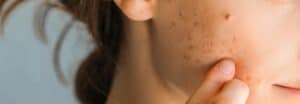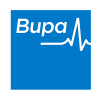April marks Rosacea Awareness Month, an ideal time to highlight this frequently occurring yet routinely misunderstood skin condition. For the numerous individuals around the globe affected by rosacea, remember that you’re not alone in your struggle. Rosacea is a chronic inflammation disorder, most notably causing facial redness and sometimes resulting in bumps similar to pimples, leading to discomfort and emotional distress.
In this blog post, we aim to provide support, insight and advice on how to cope and manage rosacea effectively. Whether you’ve recently been diagnosed, are in the process of managing your rosacea or are seeking information for a loved one, this is your essential guide about rosacea.
Rosacea Explained
Uncovering the Causes and Triggers
- Genetic factors: There seems to be a noticeable hereditary link to rosacea.
- Demodex mites: These natural occupants of human skin may proliferate on the skin of rosacea patients.
- Environmental stimuli: Extreme temperatures, wind exposure, humidity and sun can spark flare-ups.
- Skin barrier dysfunction: A weakened skin barrier might lead to heightened sensitivity and inflammation.
- Food factors: Certain foods and drinks like spicy food, alcohol, and hot drinks may trigger rosacea in some individuals.
- Emotional stress and anxiety
Symptoms and Rosacea Variations
Symptoms of rosacea can greatly differ from one person to another and might involve:
- Facial redness (also known as erythematotelangiectatic rosacea)
- Swelling and a rough texture (referred to as papulopustular rosacea)
- Skin thickening and enlargement (termed phymatous rosacea
- Eye-affecting rosacea (ocular rosacea) which can cause redness, dryness and irritation in the eyes
Strategies for Managing Rosacea
Prevention and Trigger Avoidance
- Detect and evade triggers that amplify your condition, such as alcohol, spicy foods, caffeine and harsh temperatures. A diary might be helpful in monitoring these triggers.
- Guard your skin using a broad-spectrum sunscreen with an SPF rating of 30 or above, even on overcast days.
- Opt for gentle, non-irritating skincare products and steer clear of those containing alcohol, witch hazel, fragrances, menthol, peppermint or eucalyptus oil.
- Establish and follow a daily skincare routine, including cleansing and moisturising.
- Try to avoid rubbing or scrubbing your face.
- Use tepid water for facial cleansing and pat your skin dry gently.
Medications and Specialised Treatments
- Topical treatments: These are applied directly to the skin and can include metronidazole, azelaic acid, ivermectin and brimonidine.
- Oral antibiotics: Usually used for more extreme cases or where ocular symptoms are present. Tetracycline, doxycycline and minocycline are commonly used.
- Isotretinoin: This oral medication might be prescribed for severe cases or where other treatments haven’t worked.
- Lasers and other light-based treatments: Certain procedures can lessen the redness and visible blood vessels linked with rosacea.
Lifestyle Adjustments for Rosacea
- Manage stress with relaxation methods like yoga, meditation or deep breathing exercises.
- Stay hydrated with water and avoid hot, caffeinated or alcoholic beverages.
- Maintain a healthy, balanced diet.
- Experiment with dietary changes, as some people discover that specific foods can set off their rosacea.
Support Systems and Resources
Locating a supportive community can greatly improve how you handle rosacea. Consider becoming a part of a support group, either face-to-face or online, to connect with others sharing similar experiences.
Minimising the Emotional Impact of Rosacea
Building Self-Esteem
Feeling self-conscious about the appearance of your skin can weigh on your self-esteem. Bear in mind that your worth extends beyond your skin, and endeavour to focus on your positive traits.
Getting Professional Aid
Should you find that rosacea is severely impacting your mental health, consider reaching out to a mental health professional for assistance. Therapy can be valuable in handling the emotional aspects of chronic conditions.
Final Thoughts
Navigating rosacea is a lifelong journey requiring patience, support, and occasionally lifestyle alterations and routine adjustments. Awareness and comprehension of the condition, from those living with rosacea and those around them, are the cornerstone of successful management. By adhering to the guidelines set out here and collaborating closely with your health provider, you can lead a vibrant, fulfilling life while effectively handling rosacea.
This Rosacea Awareness Month, take a moment to appreciate your strength and resilience and continue to seek out the resources and support that suit your needs best.






